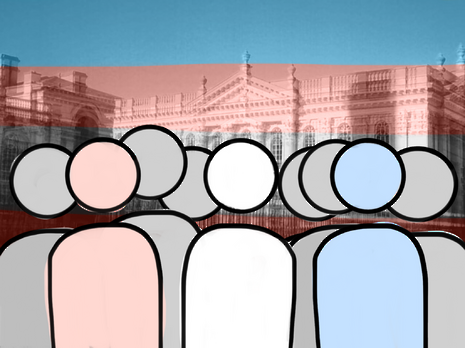For its trans students to feel at home, Cambridge needs to do better
Frankie Kendal implores the University to focus their efforts to make trans students feel comfortable and welcome in every aspect of their Cambridge experience

Content Note: This article contains discussion of transphobia, misgendering, and dysphoria
Everyone at the University of Cambridge, and at university in general, will understand the overwhelming, exhilarating, anxiety-inducing time that is being a Fresher. For all of the difficulty in starting university, it’s made clear how supported we are. However, for trans freshers, and for trans students across all years, this support is not heard quite as loudly.
Cambridge is, for an institution steeped in tradition, generally progressive and seeking to improve, as seen recently when the University rescinded its visiting fellowship offer to Jordan Peterson on the grounds of his explicit anti-LGBTQ+ views. However, despite trans people having always been members of society, it is only in the past few years that trans inclusion has become a priority within the University, for example trans women being accepted into women’s colleges only became policy in 2017.
When the idea of studying at Cambridge became a reality, I was certainly anxious as to how inclusive my new home would be. I purposefully applied to a college with an LGBT+ society and spent hours poring over the resources available to trans students.
The CUSU LGBT+ Campaign has two trans officers, along with a whole campaign dedicated to improving trans inclusivity across campus. Eventually, my fears became excitement for the new prospects university would hold.
But there was a threat to this excitement before I even walked through the gates of my college. Setting up my CRSid was, although tedious, a symbolic experience that I had achieved something of which to be truly proud of, and yet this was undermined by the realisation that the initials of my previous name had been used. Nevertheless, I emailed my Senior Tutor to correct the mistake, expecting that the issue would be resolved. Instead, I was told that such a change was impossible and that “it won’t be an issue”. A statement that was aimed to comfort my uneasiness, in reality, shed light on the University’s ignorance of trans issues.
Incorrect CRSids create a personal stress by forcing students to use an old name, that many trans people have an uncomfortable relationship with, on a daily basis. More so, fellow students will often inquire, out of curiosity, about the incompatibility of one’s name and their CRSid, leading to trans students having to engage in conversations regarding their birth name, a topic that many find distressing.
In failing to ask for pronouns, supervisors, Directors of Studies and Tutors are failing their students
Even if the impossibility of changing CRSids is genuine, and not just a hassle, the University can still rectify this through asking students the initials they would prefer prior to their ID's manifestation – with the incessant amount of forms and questions that are already sent out, it feels that this would barely make a difference for Cambridge, but a large difference for the student body.
Ironically it was the student reaction I was more worried about prior to my arrival. Yet as our generation waves an increasingly progressive flag, students have been often more supportive than I would have expected. For trans freshers, introductions are challenging: you are asking to be viewed and perceived as someone who you may not yet look like. But asking pronouns is becoming a more common occurrence – my favourite thus far has been in the middle of the Cindies dancefloor, proving that having a good time and being trans-inclusive are not mutually exclusive.
As someone who is trans masculine, I am speaking from a place of privilege, and the discrimination against trans women cannot be overlooked. That being said, although unawareness is still prevalent, in my experience, prejudice is less so.
Unfortunately, this inclusivity seems to remain within the realm of students. Such practices have not been adopted by many members of staff, and in failing to ask for pronouns, supervisors, Directors of Studies and Tutors are failing their students. When walking into your first supervision, the only worry on your mind is academic. Therefore, to have a supervisor misgender you in a space that should be for academic and creative freedom, that room suddenly becomes riddled with dysphoria.
The inability of Cambridge to properly train their staff on how to respect and include trans students, despite being a member of Stonewall’s Diversity Champions Programme, is damaging, especially for a University with supposedly the highest proportion of LGBT+ students in the UK.
With an active LGBT+ Campaign and access to trans-inclusive research and policies being widely available, all staff in Cambridge have no excuse not to include trans students and be educated on our needs.
As an institution that is highly regarded across the globe, Cambridge should be ensuring that trans inclusion is taken into consideration in every aspect of University life. That is not to say that Cambridge has forgotten about trans people. Instead, it is a recognition of the fact that – if the University is to be a place where trans students can feel at home and where they are supported just as much as everyone else – there is still work to be done.
 Features / Should I stay or should I go? Cambridge students and alumni reflect on how their memories stay with them15 December 2025
Features / Should I stay or should I go? Cambridge students and alumni reflect on how their memories stay with them15 December 2025 News / Cambridge study finds students learn better with notes than AI13 December 2025
News / Cambridge study finds students learn better with notes than AI13 December 2025 News / Uni Scout and Guide Club affirms trans inclusion 12 December 2025
News / Uni Scout and Guide Club affirms trans inclusion 12 December 2025 Comment / The magic of an eight-week term15 December 2025
Comment / The magic of an eight-week term15 December 2025 News / Cambridge Vet School gets lifeline year to stay accredited28 November 2025
News / Cambridge Vet School gets lifeline year to stay accredited28 November 2025









